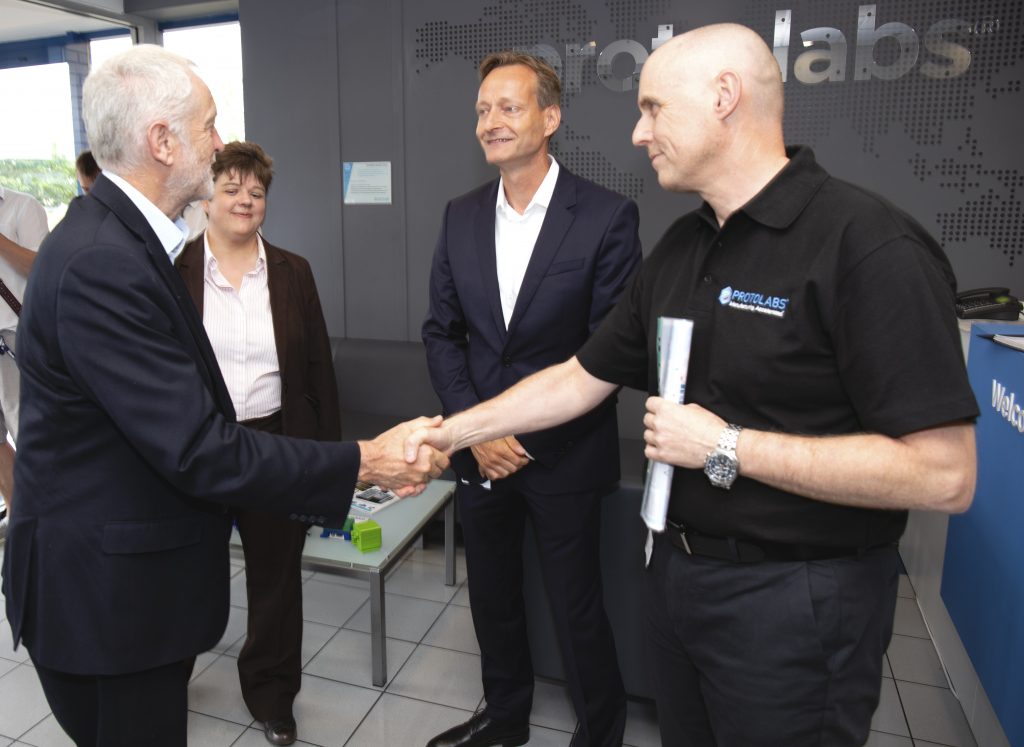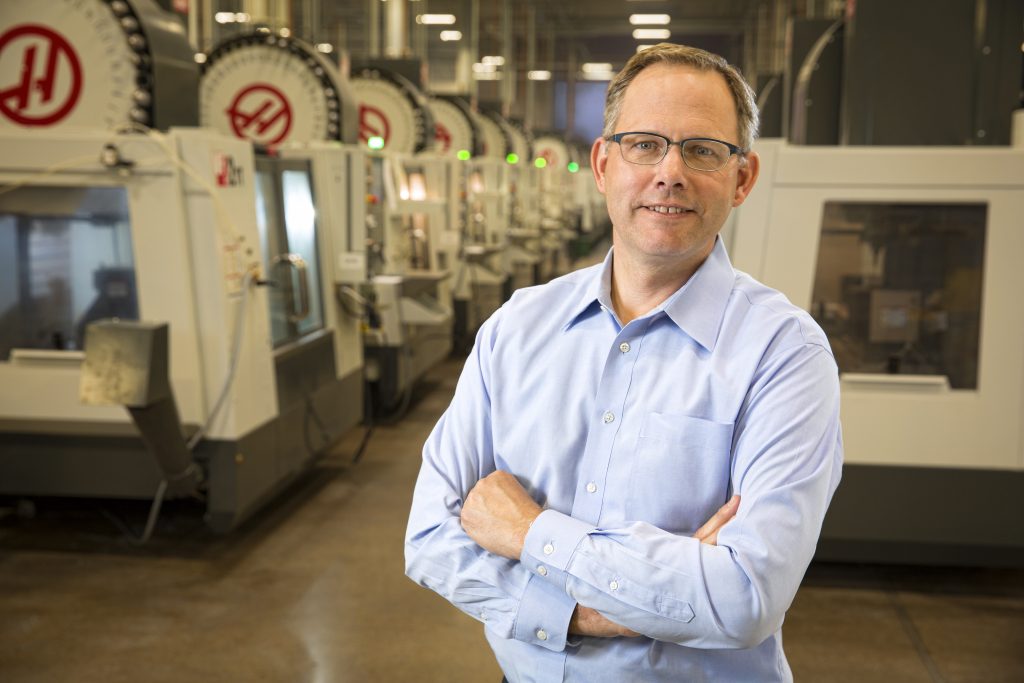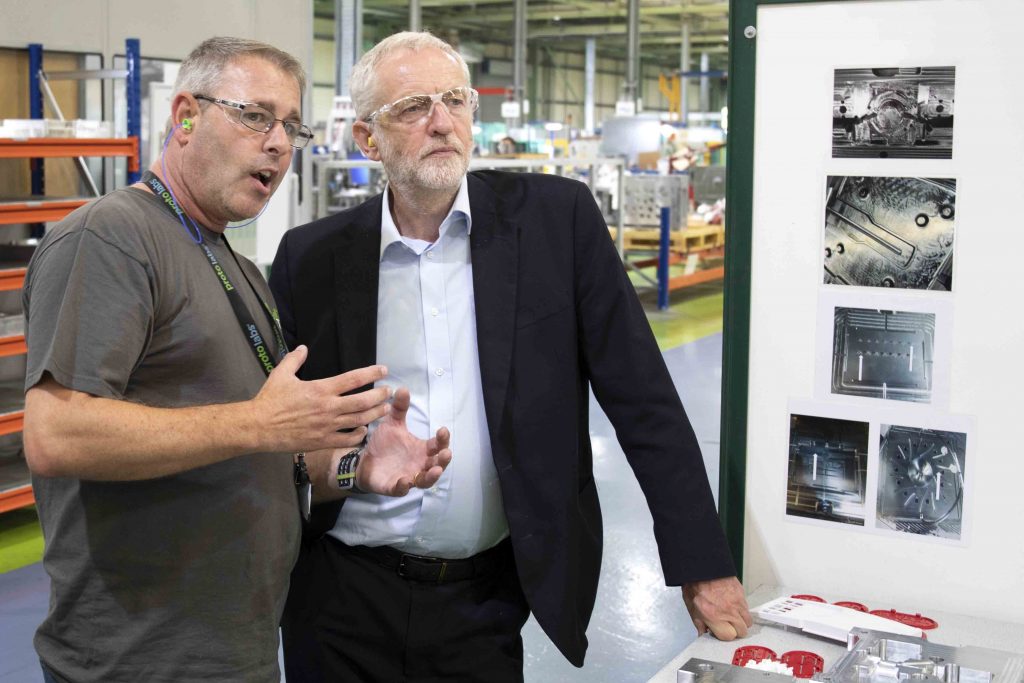Jeremy Corbyn, leader of the UK’s Labour Party, was given insights into industrial 3D printing and the role that digital manufacturing may play in a post-Brexit Britain yesterday.
Following a speech in Birmingham, Corbyn travelled to Telford to learn first hand how Protolabs works with digital manufacturing services including injection molding, CNC machining and advanced 3D printing.
The day marked the launch of a campaign by the Labour Party, currently serving in opposition to Theresa May’s Conservatives, focused on increasing manufacturing in the UK.
High-value manufacturing, and specifically 3D printing, is seen by many experts as pivotal to the long term economic prosperity of the country. Last year AM UK set how additive manufacturing could enable the UK to remain as such a high value manufacturing nation.

Reprogramme the economy
The Birmingham speech was delivered to manufacturers organisation, the EEF, with Corbyn saying, ““A lack of support for manufacturing is sucking the dynamism out of our economy, pay from the pockets of our workers and any hope of secure well-paid jobs from a generation of our young people. It must be our job in government to reprogramme our economy so that it stops working for the few and begins working for the many.”
“Labour is launching this campaign today because we want to see well-paid jobs in the industries of the future, fuel the tax revenues that fund our public services and the NHS and increase living standards for all.”
On arrival at Protolabs’ 108,000 sq. ft. facility, the Labour Party leader had an opportunity to inspect metal 3D prints and to learn more about digital manufacturing. In particular how Protolabs can serve as a product development tool for engineers and a manufacturing resource for companies large and small. Rich Baker, Protolabs CTO, gives more details about these services in our interview here.

Moving investment from property speculation to manufacturing investment capital
Corbyn’s visit was an opportunity for the politician to provide further thoughts on manufacturing, “I have drawn a comparison with Germany which has a bigger manufacturing base and a lot more proactive government support for manufacturing. In Britain there has been much less support, which has meant that we’ve become more of a financial services economy. It’s not economic nationalism, so much as saying that we could do far more here.”
“We do have problems. One is skilled workers and supply, the other is lack of investment capital in manufacturing because investment largely goes into property speculation. It’s about rebalancing. If, for example, somebody came along and wanted to set up a company like Protolabs here in Telford, with a completely new idea, where would they get the finance for it? Who would back them for it? There’s probably nobody, so they’d sell their idea to China or India and we’d then import the product later on.”

“This is about supporting innovation here. As a country we cannot put the borders up because we are a trading country. We are a trading nation and we always have been. The balance has to be struck. It’s not about saying to a global company like BMW you’re not welcome here. Quite the opposite. What we would say is that we want you to be here, but we also want you to be here for the long term, investing in research and training.”
“We’re also saying the public sector could do a lot more when it buys, making sure it improves local communities. Local authorities buying in goods and services can do much more to develop their local community. Preston, an example of quite high employment, lost a lot of manufacturing jobs. The council, a big employer and big purchaser has an avowedly local policy which has helped regeneration locally. It’s a balance, yes, and you’ve got to be careful how far you go with it.”
“Regional investment is also required to ensure we get the smaller infrastructure needs: roads, railways, etc., but also a preparedness to support or guarantee investment and loans into developing companies in areas like Telford.”
The UK’s manufacturing industry is still trying to understand how leaving Europe may change business conditions. 3D Printing Industry asked leading companies for their perspective on how Brexit will affect additive manufacturing.
You can also read more about the wider impact of trade war tariffs on additive manufacturing in this article with insights from 3D printing insiders.
Get all the latest 3D printing news direct to your inbox, subscribe to the free 3D Printing Industry newsletter. Also, follow us on Twitter, and like us on Facebook.
Looking for a change of pace? Seeking new talent for your business? Search and post 3D Printing Jobs for opportunities and new talent across engineering, marketing, sales and more.
Featured image Jeremy Corbyn holds a 3D printed prototype at the Protolabs manufacturing facility in Telford. Photo via Protolabs.



